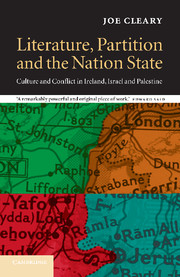2 - Estranged states: national literatures, modernity and tradition, and the elaboration of partitionist identities
Published online by Cambridge University Press: 22 September 2009
Summary
In many contemporary theories of nationalism, cultural and communications media are ascribed an important function in developing and maintaining a sense of national consciousness and national sentiment. These theories provide the conceptual basis that can help to explain why the development of a national literature is always an important dimension of the modern state-building project. Like national museums, national broadcasting services, national galleries and national newspapers, national literatures are a stock assumption of the modern nation-state. They serve multiple functions, which extend to both domestic and international audiences. The construction of national literatures usually involves processes of linguistic standardisation and canon selection designed to promote the sense of a shared national culture overarching ‘subsidiary’ regional, religious, ethnic, gender or class differences. For domestic audiences, therefore, national literatures help to create a sense of a shared cultural inheritance and a sense of a common destiny. In the international arena, they allow nation-states to establish cultural credentials that in turn allow them to secure full political recognition and to compete for cultural status and prestige.
For most contemporary theorists, nationalism is an essential element of modernisation, an ineluctable feature of the transition from agrarian to industrial or from pre-capitalist to capitalist society. Modern industrial or capitalist economies require the state, and the state in turn can operate successfully only if it can develop and be maintained by a common, accessible, written culture.
- Type
- Chapter
- Information
- Literature, Partition and the Nation-StateCulture and Conflict in Ireland, Israel and Palestine, pp. 51 - 94Publisher: Cambridge University PressPrint publication year: 2001



